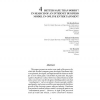Free Online Productivity Tools
i2Speak
i2Symbol
i2OCR
iTex2Img
iWeb2Print
iWeb2Shot
i2Type
iPdf2Split
iPdf2Merge
i2Bopomofo
i2Arabic
i2Style
i2Image
i2PDF
iLatex2Rtf
Sci2ools
112
click to vote
IFIP
2001
Springer
2001
Springer
Better Safe than Sorry? In Search of an Internet Business Model in Online Entertainment
This paper presents an action case study of the process by which the Swedish computer game developer Daydream Software planned, developed, and implemented the business model for its new online game, Clusterball. In particular, the paper explores Daydream’s choice between a radical business model and a conservative one for the game. Building on forecasts that “casual gamers” such as academics, business people, middleagedpeople, and women wouldbecomeimportantforthefuture growth of the electronic games software industry, Daydream first pursued a radical business model, viewing the game as an “entertainment portal.” However, in light of the perceived need of results and release, a more conservative business
Game Developer Daydream | IFIP 2001 | Paper Explores Daydream | Programming Languages | Radical Business Model |
| Added | 30 Jul 2010 |
| Updated | 30 Jul 2010 |
| Type | Conference |
| Year | 2001 |
| Where | IFIP |
| Authors | Ola Henfridsson, Helena Holmström, Ole Hanseth |
Comments (0)

